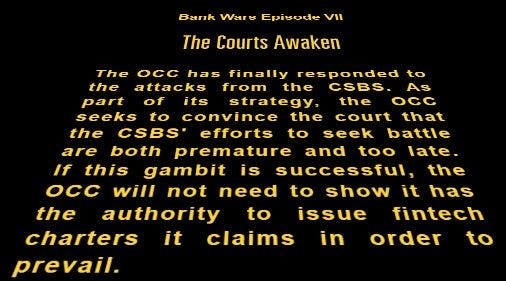Bank Wars Episode VII: The Courts Awaken (Part One)
The Conference of State Bank Supervisors (CSBS) has sued the Office of the Comptroller of the Currency (OCC) over the OCC’s potential…
The Conference of State Bank Supervisors (CSBS) has sued the Office of the Comptroller of the Currency (OCC) over the OCC’s potential non-depository special purpose national bank charter for fintech firms. The CSBS arguments boiled down to the assertion that the OCC has exceeded its statutory authority and has failed to follow the proper procedure. After a small stumble involving excessive footnotes the OCC has responded.
The OCC has moved to dismiss the CSBS law suit on the grounds that the OCC has not yet done anything that it can be sued over, therefore the court should dismiss the CSBS case as premature without even reaching the merits of the CSBS’ argument. The OCC does not rely solely on procedural arguments, however; it argues that even if the court were to reach the merits of the case, the OCC is within its authority to issue a charter. Finally, in an effort to avoid having to litigate over a rule the OCC cites as enabling the fintech charter, which is undisputedly final, the OCC argues that the CSBS has waited too long to file a suit challenging the rule and therefore has missed its chance.
We are going to take the OCC’s argument in pieces, focusing first on its argument that the CSBS is too early (or too late) to bring the suit. Then in another post we will turn to the OCC’s substantive defense of its authority to issue non-depository charters.
Timing is everything
The CSBS is too early
The CSBS has portrayed the OCC’s decision to issue non-depository fintech charters as final and the actual issuance of charters as imminent. In its filing the OCC takes a different view, casting the OCC’s work on the fintech charter as inchoate and still up for debate. Why? Because courts do not take cases based on the hypothetical possibility that an injury may occur if several contingencies are met. The risk of harm must be concrete. By arguing that it has not yet decided whether or how to issue a non-depository fintech charter, the OCC hopes to persuade the court that the CSBS lawsuit is premature and should be dismissed until the OCC does something final.
In support of this argument, the OCC points to the fact that both the OCC’s whitepaper on the OCC’s intention to pursue a non-depository charter and the proposed draft supplement to the OCC licensing manual solicited feedback from the public and therefore couldn’t be final. As further evidence that the OCC has not committed to any course of action, the OCC also points to Acting Comptroller Norekia’s recent statements that the OCC has not yet finalized the requirements for the non-depository fintech charter, decided whether it would proceed, or received any applications. After all, if the OCC hasn’t actually done anything yet, it couldn’t have done anything wrong yet or caused anyone, including the CSBS and its members, harm.
The OCC argues that this would mean three important things. First, the CSBS lacks standing to sue because it and its members haven’t actually been harmed by anything the OCC has done. No action means no injury which means no standing. Further, if the OCC is right nobody could sue the OCC over the fintech charter (yet) because the court would lack jurisdiction. Under the US Constitution courts only have jurisdictions over matters where there is an actual “case or controversy.” If the OCC hasn’t actually done anything besides engage in internal (though public) deliberations, there is no case or controversy for the court to address. Finally, if the OCC hasn’t undertaken “final agency action” as defined by the Administrative Procedure Act (APA), the CSBS cannot complain about the process the OCC underwent. That process is not yet complete. After all, the APA does not require notice and comment for an agency’s consideration of whether it wants to pursue a possible action. All of this adds up to the OCC arguing that the court should dismiss the CSBS’ case without getting to the merits of whether the OCC can in fact issue a non-depository fintech charter.
The CSBS is too late
But wait, isn’t the CSBS challenging the validity of the regulation the OCC cited as enabling the non-depository fintech charter? It can’t be that an existing regulation is not subject to judicial scrutiny because it is too early, right? Right. But the OCC has an argument there as well, that the CSBS is too late.
The OCC argues that the CSBS’s facial challenge to 12 CFR 5.20(e)(1), which became effective in 2004, is time barred because there is a six-year statute of limitations for a pre-application challenge to a rule. The clock on the statute of limitations starts ticking once the rule is finalized. The OCC argues that the CSBS missed its window to challenge the inherent validity of the rule. While this would not prevent the CSBS from challenging the validity of the rule as applied to a particular act done by the OCC, the OCC argues no such act has occurred (see above).
The OCC’s timing arguments seek to get the court to throw out the case without having to consider the substantive arguments about whether the OCC is actually authorized to issue a non-depository charter. This does not mean that the OCC has nothing to say on substance. To the contrary, it has quite a bit to say, but that will need to wait for the next part of this episode of Bank Wars.




